
(Photos: J. Maus/BikePortland)
Eight Portland mayoral candidates met at Revolution Hall Monday night in a debate that was supposed to happen, then wasn’t, then did anyway.
The odd background: The Oregonian called the debate and promoted it for weeks, but restricted it only to two candidates (Jules Bailey and Ted Wheeler). After protesters threatened to disrupt the event, The Oregonian changed course and said it would close the debate to the public to prevent possible violence. That led Bailey and Wheeler to bail, at which point The Oregonian’s editorial board accused those two candidates of lacking “courage”. Then Wheeler suggested to Revolution Hall that they host a debate anyway and invite all the candidates. Eight showed up.
Beth Slovic of Willamette Week, Israel Bayer of Street Roots and Jefferson Smith of XRAY.fm (a former mayoral candidate himself) volunteered to moderate.
And transportation was a pretty big topic.
Among other things that happened: one candidate (Sarah Iannarone) called in her closing statement for us to move gradually toward a car-free downtown. Another (Wheeler) suggested cutting service from the downtown Portland Streetcar to improve transit in East Portland. A third (Bailey) said the city’s top-priority transportation challenge is safety. And virtually every candidate on the stage seemed to agree that Portland needed to increase its supply of central-city housing by re-legalizing garden apartments, duplexes and triplexes in residential zones.
Before sharing how the candidates answered questions, we figured it’d be worthwhile to share photos of each one. After all, last night was just as much about the people running for mayor as it was about the issues:
In order from how they sat on stage last night:
Deborah Harris
Jules Bailey
Sean Davis
Ted Wheeler
Bim Ditson
Sarah Iannarone
Jessie Sponberg
David Schor
Here are some selections of what candidates said on transportation and related subjects. Not every candidate is listed for every question because I didn’t catch a policy proposal in every answer. I also omitted answers and issues that echoed things most other people on stage were saying. And of course there was discussion of a lot of important issues that aren’t as closely linked to transportation; those answers are omitted here too. (The full video is below.)
What can the city do about global warming?
David Schor: “We’ve got to have environmentally conscious building. … We need our city to set the example for our community by investing in green technology, fuel efficiency and electric vehicles.”
Deborah Harris: We need to increase education so more people know that it is a problem and what they can do.
Bailey: Home weatherization gives the highest bang for buck while creating well-paying blue-collar jobs.
Wheeler: “We don’t want to be a fossil fuel exporter. … We invented green building here in this city … it is still our brand nationally and globally.”
Iannarone: “The number-one thing we can do is keep Portland compact. We maintain our boundary, we continue to grow efficiently.”
What is the city’s biggest transportation problem and how would you fix it as mayor?*
(*We submitted this question! Thanks to Beth Slovic at Willamette Week for asking it.)
Bim Ditson: “I don’t think there’s a single biggest. i do think there are things we can look at to reduce traffic. … It’s been shown by almost every major city in the world that moving away from cars beenfits everyone’s safety and everyone’s mobility. … I would definitely be an advocate for expanded bike lanes. I would look at getting bikes away from cars so they don’t get hit by them.”
Iannarone (answering immediately after): “He’s 100 percent right on those fronts. We need to press for more money. … The gas tax is a road to nowhere; we know those can’t sustain but we’re going to have to come up with more money. … Making streets that work for everyone and not continue to subsidize the automobile any further because it is killing us.”
Schor: “We need to make some huge investments in bike infrastructure to make biking a priority. We need to focus on preventing displacement. we need to make sure that people can continue to live in the inner city.”
Harris: “Encourage employers, when they have different locations for businesses, try to encourage their employees to relocate closer to their work.”
Bailey: “Congestion is obviously a problem, maintenance is obviously a problem. But you asked about our biggest problem, and that has got to be safety. The stretch of 122nd …. is one of the most dangerous in the nation. … We need a better transit system with better rubber-tire bus service.”
Davis: “We need to increase density. If we have more density downtown and more people living downtown, we’re not going to have people using transportation as much.”
Wheeler: He said the city lacks adequate public transit. On biking, he said, “we need two things”: separated bike lanes and continued investment in the neighborhood greenway network, which he described as “cost effective” and “a way to support commmunities that don’t currently have parks.”
Will you support bus passes for all PDX high schoool students?
Every candidate raised their hand.
Along with simply building more, what can be done to improve renter protections in the housing market?
Bailey: “We have a housing crisis in Portland. … It’s too hard to find a place to be able to call your own. … We need more supply but it’s not just about more supply. … We need more protections to renters. We need to focus on limiting the reasons that people can be evicted from their homes. … We need longer notice.”
Davis: “I would like to look into licensing people who own buildings, just like I have to have a license when I own a business.”
Wheeler: The city needs a “just-cause evictions policy similar to that was just in Seattle” and “an office that makes it clear to landlords what their legal obligations are and what tenants legal rights are, and has both the enforcement capability and the ability to give penalties to people who violate the existing laws.”
Advertisement
Ditson: “Every rental agreement should come with an easily digestible pamphlet that tells people what their rights are. … Whether we stack on more housing or not, we need more inclusionary zoning.” Ditson said (seemingly inaccurately, as of last week) that “right now it seems like the state’s not going to do that” and called on the city to defy the state’s bans on rent control and inclusionary zoning and test them in court.
Jessie Sponberg: “We make a one-time fee you pay to the city” for a credit and background check instead of paying the same $50 to every landlord, he said. He added: “Inclusionary zoning. Who doesn’t love a good duplex and triplex?”
Schor: “We need landlord registration … [and] something that would approximate the rent control and inclusionary zoning that we are preempted from doing at the state level.”
Harris: First we need to ask, “Why are they being evicted? Affordable housing, gentrification. … Why are the houses unaffordable? because they’re having to move out.”
How can we improve policing?
Among many other suggestions on this subject, both Wheeler and Bailey called for police to get “out of their cars and on the streets” in order to better connect to the community.
How can we increase affordable housing in the city?
Wheeler: “Change the zoning. … In parts of the city, garden apartments are not legal. We’re not allowed to have duplexes except on the corners. … We’ve got to ensure that the city’s processes for affordable housing aren’t stepping on the air-hose of new supply.” Wheeler also called for the city, state and county to eliminate barriers to building accessory dwelling units.
Ditson: “We need to put in multifamily units; the way that we do that has to be community-driven. … We have to ask the people who are there how should we build these.” He called for a “cookie-cutter system to have developers come in and build the right thing instead of having no guidelines for them to come in and build the wrong thing.”
Iannarone: “Increasing supply everywhere is going to be key. … Bonding against future stock with public housing. We need to call it what it is and we need to bond against it right now while it’s cheaper.”
Sponberg: He pointed out that according to Zillow there are “700 bank-owned homes” in the city. “Somehow this country allowed the banks to steal these houses from these families.”
Schor: The most important thing we can do for housing, he said, is to raise money for subsidizing more public housing, including with a new income tax on the top 1% of income earners.
Bailey: A “dedicated revenue stream for affordable housing” with the property tax endorsed by the Welcome Home Coalition; “duplexes, triplexes, garden home apartments” and “we need to have owner-occupied structures – housing that is affordable to working families.”
Davis: “30 seconds for the most important issue that we have in Portland?” He said the power to make housing affordable rests with individuals, who he said should attend their neighborhood association meetings and “go and tell them what you want.”
How can we improve public transit?
Iannarone: We should ensure that bus rapid transit planned on SE Powell and Division doesn’t create gentrification, she said. Iannarone also said she would like to “get engaged in regional issues” by attending JPACT and MPAC meetings at Metro, committees on which the city’s transportation commissioner sits but does not always attend.
Wheeler: “When we have the streetcar in downtown portland getting as much resource as it would take to put transit throughout East Portland … our priorities are not straight. … I was a co-author of the East Portland Action Plan, along with Jeff Merkley and Mayor Tom Potter. … If I’m elected, it comes off the shelf and we’re going to act.”
Bailey: Though the city doesn’t control TriMet, “the mayor has a bully pulpit” on mass transit issues, Bailey said. He called for new revenue that could hold down fares. “We have a model that is based on payroll taxes and user fees and it drives up the cost. We have to have leadership to change that.”
Schor: “Public transit is a pretty big part of what makes Portland so special. … Right now it’s actually more effective for a lot of folks to drive downtown and park rather than take the bus. That is wrong.”
There was one more notable bit of transportation talk, and it came in Iannarone’s closing statement, in which she said she decided to run because “we need a vision. This is no time for resting on laurels or complacency.” Here’s what she said:
I don’t hear anyone saying what Portland is going to be the best at. Portland is going to be the most livable city on Earth. And we can do this. We have to make sure that what we’re doing works for everyone here. And what does that look like? I think it looks like dreaming big. Can we have a car-free downtown? Yes. Compact walkable neighborhoods all over this city from edge to edge, not just in the Pearl? Yes. Can we have trees? Yes. Clean water? Yes. Let’s do it all. An anti-racist police force — let’s do it. Let’s go back to being Portland again.
Overall it seemed like the event was a success — especially given the circumstances leading up to it. The crowd was energized and so were the candidates. And while there weren’t any back-and-forth exchanges or in-depth follow-up questions, the value was in hearing more voices, new ideas, and seeing how the candidates handled themselves. Who won this debate? That’s easy. Portland did.
–
Here’s the full video, courtesy of Willamette Week:
— Michael Andersen, (503) 333-7824 – michael@bikeportland.org
— Jonathan Maus, (503) 706-8804 – jonathan@bikeportland.org
BikePortland can’t survive without paid subscribers. Please sign up today.



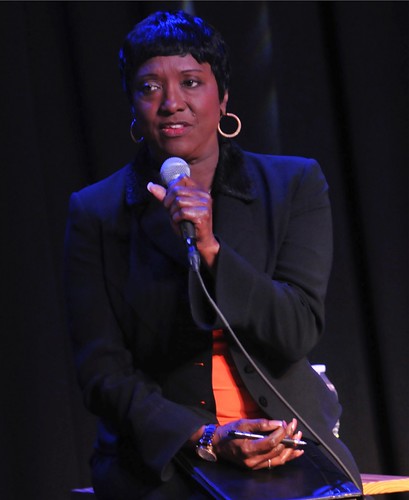
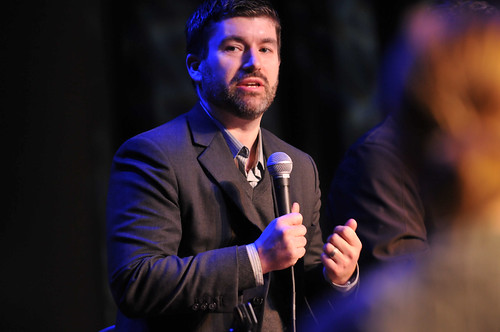

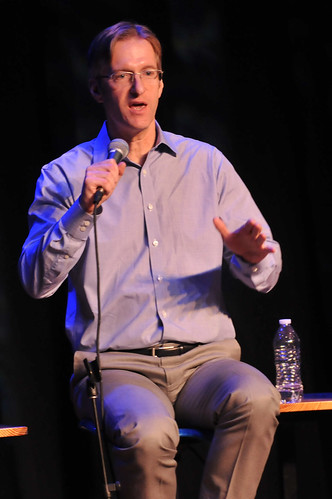
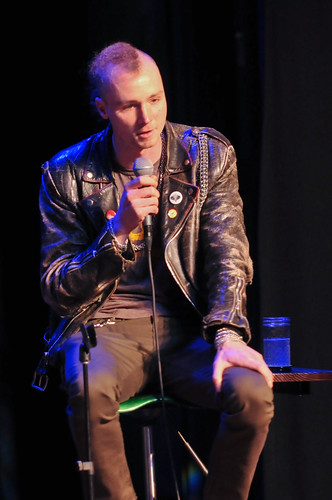
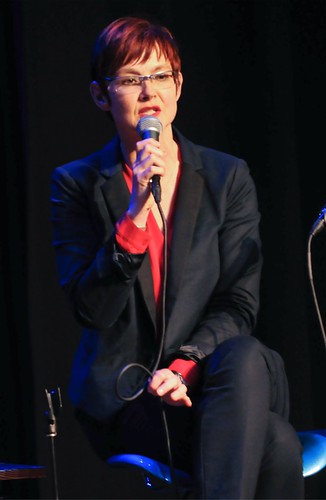
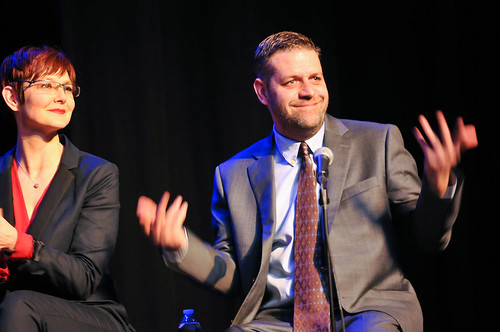
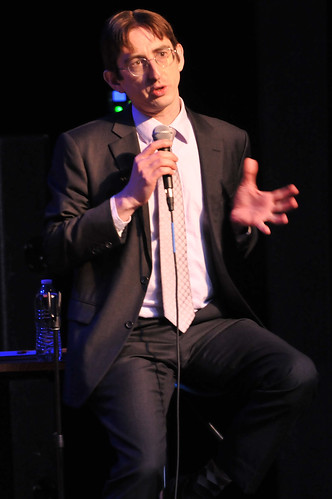
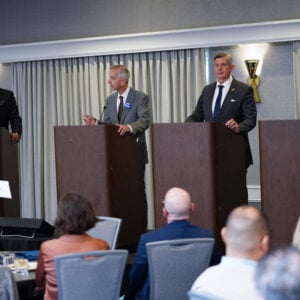
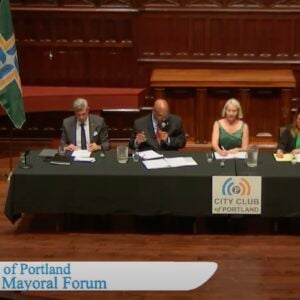


Thanks for reading.
BikePortland has served this community with independent community journalism since 2005. We rely on subscriptions from readers like you to survive. Your financial support is vital in keeping this valuable resource alive and well.
Please subscribe today to strengthen and expand our work.
Wow Jules, I had no idea that all it takes to solve global warming was a few tubes of caulk! 😉
I would rather the city subsidize weatherization and efficiency improvements over handouts for “green” new construction. New construction tax breaks mostly benefit the wealthy.
Sure, but it was a ridiculous answer to the question of what the city can do about global warming. Transportation is the #1 cause of climate change, and the city can certainly do something about that. Weatherization won’t save us from the inevitable food shortages, diseases, and mass extinctions that global climate change will bring.
“Transportation is the #1 cause of climate change…”
According to the EPA, electricity generation is the number one source of GHG, and weatherization would have some influence on that (especially for those running AC, electric heat, even forced air blowers), as well as the direct influence on reducing use of fossil fuels for heat.
Transportation is big, but I wouldn’t dismiss weatherization as a necessary action. We need to improve both.
http://www3.epa.gov/climatechange/ghgemissions/sources.html
According to the US Green Building Council – “The commercial and residential building sector accounts for 39% of carbon dioxide (CO2)
emissions in the United States per year, more than any other sector. ”
http://www.eesi.org/files/climate.pdf
Hard to believe there will be much money left for safety if Jules successfully revives his vision for the bloated CRC project. There seem to be folks making moves to bring it back and I don’t think we can trust Jules not to push it forward as Mayor.
Kudos, to all the candidates for rejecting the Oregonian’s “Old Time Establishment Debate” and showing that the best way to deal with people protesting exclusion is inclusion.
It’s convenient for the Oregonian to deflect the blame for effectively cancelling a public debate by blaming the candidates, even though it was the O who wanted to shut out public access and the O who brought the protests on themselves by excluding all but two candidates.
I realize it isn’t anywhere near as important as Housing/Transportation/etc, and it won’t be my deciding factor, but I would like to hear the candidates opinions on the Off-Road Cycling Master Plan. The results could have a positive effect on the economy, livability, and # of car trips out of the city to ride off-road.
Schor comes across very strong to me. We will not *begin* to change “business as usual” without electing a genuine progressive.
I liked Schor; he’s very approachable and came off as pleasantly wonky and well-versed in Portland issues. Definitely an underdog, but also definitely deserved to be up on that stage.
I left this debate feeling like Ted, Jules, or Sarah would at least be competent mayors. I thought David would be a good commissioner. I think Sean is not quite there yet, but has good potential. In terms of who “won” the debate, I’d say Ted and Sarah tied for first, David was third, Jules was fourth, Sean was fifth, Deborah and Bim tied for sixth, and Jessie was dead last. The volunteer timekeeper came out better-liked and respected than he did.
I was especially impressed with Sarah and David, considering that they did not realize they would be attending the debate until mere hours beforehand. They clearly know their stuff and were both able to hit the ground running. I think Sean would have performed a lot better with some prep time. Jules seemed to have over-prepared, or has been watching too many presidential debates. Jessie definitely has.
I wish schor had challenged Fritz.
Is it still possible for someone to head that direction instead?
It looks like March 8th is the deadline to file, although I don’t know if having filed to run for one position precludes being able to file for another position.
If you liked what you heard last night, I would recommend reaching out to Schor and telling him that you’re enthused by his platform but concerned about his chances, and encourage a run against Fritz instead. AFAIK she’s currently unopposed. Novick has at least two opponents. Again I don’t know if switching targets is possible, but Schor is a lawyer and should be able to figure it out.
I’m just not seeing enough specific policy from these candidates. It all consisted of vague feel-good hand waving. I’m afraid we’re going to be looking at the same old same old no matter who is elected. I’d love to see someone run for office and have the guts to put out specific plans of whose ox will be gored.
Well, in all fairness, due to their being 8 people involved, all answers had to be either 30 seconds or 1 minute, so there wasn’t much time for in-depth answers.
A few more things I took away from this debate:
– For the first election since I’ve been in town (12 years) we don’t have a candidate that’s pandering to the “business community” or trying to shore up more conservative voters. (in the past we’ve had Sho Dozono, Eileen Brady, Charlie Hales to some extent).
– I think the person that probably helped themselves the most in the debate was Sarah Iannarone. She had a lot of concrete policy ideas. And she’s a presumptive 3rd place and needs all the name and face recognition she can get. I’d love to see some back-and-forth between her and some of the other candidates.
– Jules Bailey is like the Steph Curry of politicians. He was amazingly on-point and very well-prepared to share his platform — and do it within the alloted timeframe. While he impressed me with his smarts and political acumen, I also thought he might have come off too polished if that’s possible.
– The only candidate I knew or had even seen before last night were Ted, Jules, and Sarah.. So It was fantastic to see and hear the other five.
– I was impressed by the passion Sean Davis showed for citizen activism, the critical thinking and professionalism of David Schor, the thoughtfulness of Bim Ditson, and the focus on displacement and keeping communities together from Deborah Harris. Jesse Sponberg was interesting to me. I liked his conviction and courageous takes on some issues; but was way too abrasive and disrespectful of everyone in the hall in my opinion.
– Last night’s event invigorated my interest in this race. Now I’m more well informed and motivated to follow the candidates from here on out. And I’m sure I’m not the only one. That to me is one important measure of a successful candidate event.
I said to some people in Martha’s before the debate that this may be remembered as the time Portland looked into the abyss, the abyss stared back, and Portland decided to do what it took to still be Portland. Afterwards, I still felt that way. We took a tentative step back from the brink last night. We need to keep it up.
Has Iannarone paid her taxes yet? She should be disqualified until she does.
Is paying for infrastructure only for the rest of us….
I’m still undecided, but leaning Sarah. My takeway about Sarah is that she’s a very fast learner. I saw her at Restore Oregon’s debate Thursday and her performance last night was light years beyond where she was less than a week ago. That’s big to me. Because Ted may be state treasurer, Jules may be a Multnomah County Commissioner, David may be a very good geeky lawyer, Bim may be an awesome drummer, Jessie may be EXTREMELY LOUD, but none of them have been mayor of Portland. There will be a learning curve for anyone, and Sarah seemed ready to learn. Man, though, I wish Sean and David could be on her city commission and Jessie showing up to meetings periodically to yell at them would just be an added bonus.
“When we have the streetcar in downtown portland getting as much resource as it would take to put transit throughout East Portland … our priorities are not straight.”
This is a dubious statement at best. The capital cost of the entire streetcar network to date is $251.42 million. Meanwhile the cost of the MAX Green line was $575.7 million. While some of that was spent on the rebuild of the transit mall, the lion’s share was spent in East Portland. The MAX red line, which increased service to Gateway transit center and added a station at Parkrose cost $125 million. The budget for Powell-Division, while not yet fixed, is likely to be somewhere around $200 million. And of course the original MAX line–the one we built first!–goes to Gresham through the heart of East Portland, at a cost of $214 million.
I’m all for increasing transit service in East Portland, including building Powell-Division and adding frequent service to 122nd Avenue. But it’s possible to advocate for better transit service there without making cheap shots at an incredibly well used transit system that serves the densest neighborhoods in the entire state.
Isn’t it more relevant to talk about the operating costs of the streetcar? That seemed to be what he was saying. The more recent figures I could find indicate that it costs $5 million a year to operate the three streetcar lines. That really wouldn’t buy you much extra bus service, considering that it costs somewhere around $14 million a year to run a frequent service bus line.
It seemed like a statement from someone playing politics than an actual thought-out transit proposal.
At any rate, cutting frequency on the streetcar would make it much less useful. It already doesn’t come frequently enough unless you happen to be able to take either the loop or north-south line.
If he’s talking about the operating costs of the streetcar then he is implicitly saying that large parts of densest neighborhoods in the entire state should no (or greatly reduced) transit service.
Per the report given to City Council last week, the streetcar network gets 15,000 daily riders. That’s more than the total ridership of all but two of TriMet’s bus lines, and is similar to the Yellow line. On a mile-per-mile basis it’s more riders than the MAX network.
Yes, that costs some public money to operate (much of it raised by parking meter revenue in the Central City), but it’s a very conservative argument to make that spending money is wasting money.
Besides the streetcars are not just about transit but are also designed to spawn density near the line. One could definitely make an argument that the route chosen on the inner eastside was not a good one for that goal but fixed rail transit does seem to lead to more development than adding bus service does.
I’m pretty sure he’s talking about the operating subsidy that the City and TriMet pay to Portland Streetcar. Capital costs at this point are irrelevant–it’s already been spent.
While the general point is well-taken that we should be investing more in East Portland transit service, the streetcar at this point has very high ridership and you’d have to replace it with something to connect NW to downtown and PSU…so his statement doesn’t really make sense in practice.
This is actually a great point, because currently, the city only pays for 10% o the operating costs of the streetcar. Since the capital costs were all covered by the city, if Wheeler wants Trimet to divert streetcar operating costs to operating costs for better bus service in East Portland, the simplest and fairest thing to do would be for Wheeler to have the city pay for ALL streetcar operating costs, freeing up a few million for Trimet to invest in better bus service.
I wonder why he didn’t propose that?
What’s wrong with TriMet spending money on serving areas like NW, the Pearl and South Waterfront?
Nothing is wrong with it. I’m saying that Wheeler is playing politics.
Ah, got it. I would tend to agree. I’m very disappointed that it seems he is likely to be our next mayor.
Streetcar ridership per mile may be high, but collections are still low, both per ride and overall, as fare enforcement is still a joke. After fare collections, TriMet and the city have an IGA to split costs 50-50. The PBOT subsidy currently runs $3-4 million per year, while in comparison bike infrastructure gets only $500,000 per year, if that.
According to the most recent survey over 90% of streetcar riders have a valid ticket. Any effort to increase that rate would likely cost more in staffing time than it would raise in incremental revenue.
Perhaps you forgot the disruption downtown in 2007-9? Streets ripped up, sewers moved, wires all over the place? How cheap is that? Maybe catching the bus on 4th & 5th, with the tacky temporary bus stops? Sweet memories.
From TriMet (2009 brochure http://trimet.org/pdfs/maxgreenline/max-greenline-factsheet.pdf):
“Efficient construction
“The project’s light rail construction began in February 2007. On the Portland Mall, TriMet worked closely with its contractors to speed
construction and ensure that customers always had access to businesses. Crews worked in three to four block segments for up to eight weeks, then moved to the next work zone to minimize construction impacts. TriMet also worked with downtown business leaders and the Portland Development Commission to enhance the long-term economic benefits of the Mall.
“The construction of the I-205 segment took place largely along an existing transitway, lending itself to a design-build construction approach. This allowed the contractor to complete the design while the alignment was being built, making it faster and less expensive.”
Of the $575 million for the green line, $12 million was spent in East Portland, $18 million in Clackamas County, and the rest in Downtown.
For the BRT, most of the funds will be spent acquiring right-of-way in inner Portland, along Powell and 82nd, and in parts of Gresham; outer Division in EP will be the cheap portion. Also, most of the densest neighborhoods, that is, were people live (and not households), are now in East Portland.
If the Powell-Division project was to spend money of property acquisition in order to have dedicated right-of-way I would be 100% in favor of that, but I have yet to read anything indicating that they are planning on that. Can you provide a source?
So the rebuild of the transit mall cost $545 million? That seems… unlikely.
The “Portland Mall Revitalization Project” was expected to cost $494 million when they started in 2004. It went up from there.
Link: http://efiles.portlandoregon.gov/Record/2434797/
Any other myths you want investigated? Santa Claus? Tooth Fairy? East Portland as a wealthy rural area?
The $494 million cost figure in the link you provided was the estimated cost (at the time) of the entire I/205 – Portland Mall Revitalization Project. This document places the cost of the mall rebuild at $160 million, which seems more proportional to the scale of the project.
I’m sorry I missed the debate. I’m no longer a Portland voter, but here are my comments:
To all candidates, your power is very limited; to do anything, you have to get two other commissioners to agree to work and vote with you. Unless you raise new taxes, the only way you can increase funding for transportation is to take away funding for something else that is vital, like homelessness, police, or fire services. You have hard choices ahead of you.
David Schor (and others): The economic involuntary displacement of blacks from inner Portland is long past – they moved to Cully and to East Portland east of 82nd (to 175th, the Gresham/Portland boundary), among other places, 10 years ago. The issue now is that gentrification is accelerating in Cully and East Portland – Blacks and immigrants are being pushed out of those areas too. Portland is becoming a city for rich white folks and starving white bicyclists, like San Francisco. This is not sustainable.
Ted Wheeler: The East Portland Action Plan was never “put on the shelf”. The community did not allow it. However, various elected officials and agency chiefs (I name no names, Ted) have ignored the plan to various degrees since it was adopted in 2009. I appreciate you calling it out, and other candidates obviously quoting from it. If you (and others) want to really know how the plan is going, I strongly suggest attending both the main monthly catered meetings (every 4th Wed, 6:30-8:30 pm, at the David Douglas Sch. Board rm, SE Market at 130th), and some of the monthly subcommittee meetings (Housing, Economic Development, Bike, Civic Engagement, LUTC, Parks, etc.) eastportlandactionplan.org
Whites can be displaced too. When someone who currently is low-car or car-free gets displaced to a place where they’re now miles from their work/school/family/social life and now needs to use a car daily, we have a problem, regardless of race or ethnicity.
Thank you for covering this! I’d only heard about Jules, Ted, and Sarah prior to this, so it’s good to learn more about the other candidates. -Caitlin
bailey: “The stretch of 122nd …. is one of the most dangerous in the nation.”
A source would be nice. A metric also – fatals? total crashes or crash rate? In America?
https://www.washingtonpost.com/news/wonk/wp/2015/08/03/where-drivers-are-most-likely-to-hit-potholes-roadkill-and-other-highway-hazards/
http://www.foxnews.com/story/2009/02/11/top-ten-deadliest-stretches-road-in-america.html
http://www.golocalpdx.com/news/most-dangerous-intersections-in-oregon
If I recall, he actually was talking about the stretch of Powell in East Portland, not 122nd, and it was mostly in terms of danger to vulnerable road users. I think Jonathan may have mis-paraphrased him here.
This was probably referring to a recent PBOT report to the Vision Zero committee: http://www.portlandoregon.gov/transportation/article/555816, page 40, in which 122nd Ave had the 1st, 2nd, 5th, 6th, and 8th worst intersections in the City of Portland, by number of crashes 2010-13, including ODOT roads. Outer Powell (US26) had the 3rd, 4th, 6th (at 122nd), 11th, 22nd, & 24th worst of the top 25. Most of the top 25 were in East Portland, east of 82nd, including most pedestrian and car fatalities. There is a good map on page 41. Most of the worst bike intersections were in inner Portland, were most of the facilities and users are (page 43-44).
The 5 worst corridors were for all combined modes:
1. West Burnside (E Burnside was not listed in the top 25)
2. SE Powell (Ross Island Bridge to 176th)
3. SE 82nd (but not NE 82nd, which was 15th)
4. SE 122nd (NE 122nd was not listed in the top 25)
5. SE Division Street (from 7th to 175th)
How is it that Bike Portland has so much better journalism than the O? Love it. Can we get Wweek, BikePortland and a few other resources together and finally knock the Oregonian out of commission? Sure seems like there is a void…
Fabulous photos, JM!
Thanks for this great coverage! I knew I could count on BikePortland to bring it.
Let’s go back to being Portland again.
I like this. And regardless of who our next mayor is, I think last night was a step in the right direction.
Thanks BP for covering this! I was just wondering who I like and now I know.
Jules looks the part of a proper progressive Portlander but disappoints at every turn 🙁
Glad they opened up the forum and hope the taste for revolution trickles down to the local level. I would like to maybe buy a house here someday.
Side-note: I think it is amusing to hear Bailey pandering to east county. Doesn’t he know they don’t vote?!
If the next mayor of Portland really wanted to do something about congestion that person would work with the State level official that represent the area to get a real commuter line between Salem and Portland. Everyday thousands of cars travel between the two cities with negative consequences ink both. But we have third world commuting options between them.
Vanpools are fine between a small city that doesn’t a bus system. But Salem and Portland each have good transit systems and they are intimately attached as the political and economic headquarters of the State.
We need real, robust, and frequent rail or BRT (which would remove a lane from the highways) and we need it fast. The irony is that our democratic political leaders keep talking about climate change and air pollution but they completely ignore all the emissions from all the cars.
There was a proposal to extend WES to Salem. That could prove useful. Amtrak already goes to Salem, but it gets expensive and the schedules are not easy to work around a typical 9-5 work schedule. There are buses from Salem to Wilsonville, however, that requires an additional transfer many people are unwilling to make. Ideally, it should be a 1-seat ride, though a transfer at Beaverton TC to downtown is relatively painless.